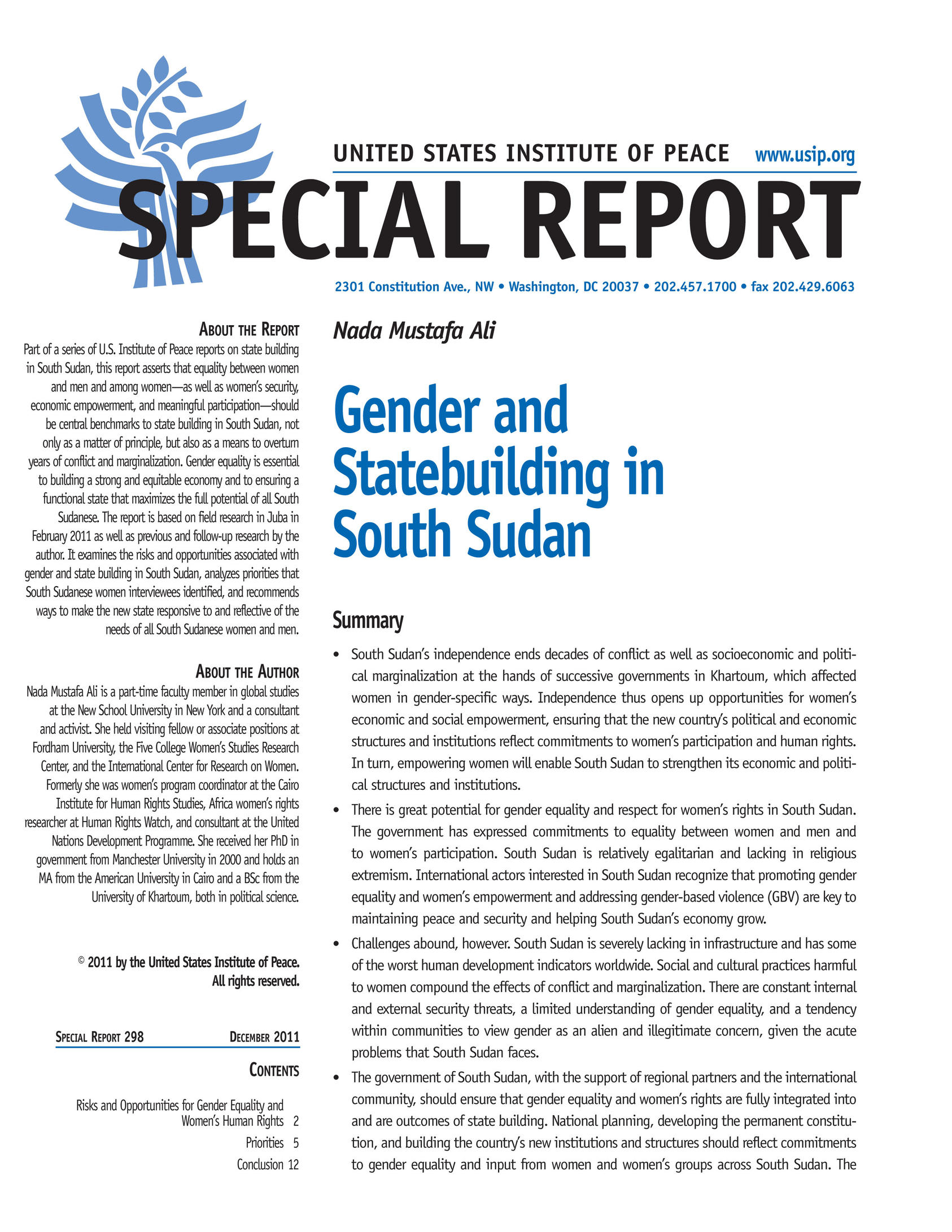Gender and Statebuilding in South Sudan
The creation of a new state gives the women of South Sudan a rare chance to enhance their security, economic empowerment, and participation in governance.

Summary
- South Sudan’s independence ends decades of conflict as well as socioeconomic and political marginalization at the hands of successive governments in Khartoum, which affected women in gender-specific ways. Independence thus opens up opportunities for women’s economic and social empowerment, ensuring that the new country’s political and economic structures and institutions reflect commitments to women’s participation and human rights. In turn, empowering women will enable South Sudan to strengthen its economic and political structures and institutions.
- There is great potential for gender equality and respect for women’s rights in South Sudan. The government has expressed commitments to equality between women and men and to women’s participation. South Sudan is relatively egalitarian and lacking in religious extremism. International actors interested in South Sudan recognize that promoting gender equality and women’s empowerment and addressing gender-based violence (GBV) are key to maintaining peace and security and helping South Sudan’s economy grow.
- Challenges abound, however. South Sudan is severely lacking in infrastructure and has some of the worst human development indicators worldwide. Social and cultural practices harmful to women compound the effects of conflict and marginalization. There are constant internal and external security threats, a limited understanding of gender equality, and a tendency within communities to view gender as an alien and illegitimate concern, given the acute problems that South Sudan faces.
- The government of South Sudan, with the support of regional partners and the international community, should ensure that gender equality and women’s rights are fully integrated into and are outcomes of state building. National planning, developing the permanent constitution, and building the country’s new institutions and structures should reflect commitments to gender equality and input from women and women’s groups across South Sudan. The government should cost and meet the full budgetary needs of the Ministry of Gender, Child, and Welfare; ratify and implement the Convention on the Elimination of all Forms of Discrimination against Women and the Protocol to the African Charter on Human and People’s Rights on the Rights of Women in Africa; strengthen efforts to prevent GBV and address the needs of GBV victims and survivors; and invest more in quality and accessible health and education.
About the Report
Part of a series of U.S. Institute of Peace reports on state building in South Sudan, this report asserts that equality between women and men and among women—as well as women’s security, economic empowerment, and meaningful participation—should be central benchmarks to state building in South Sudan, not only as a matter of principle, but also as a means to overturn years of conflict and marginalization. Gender equality is essential to building a strong and equitable economy and to ensuring a functional state that maximizes the full potential of all South Sudanese. The report is based on field research in Juba in February 2011 as well as previous and follow-up research by the author. It examines the risks and opportunities associated with gender and state building in South Sudan, analyzes priorities that South Sudanese women interviewees identified, and recommends ways to make the new state responsive to and reflective of the needs of all South Sudanese women and men.
About the Author
Nada Mustafa Ali is a part-time faculty member in global studies at the New School University in New York and a consultant and activist. She held visiting fellow or associate positions at Fordham University, the Five College Women’s Studies Research Center, and the International Center for Research on Women. Formerly she was women’s program coordinator at the Cairo Institute for Human Rights Studies, Africa women’s rights researcher at Human Rights Watch, and consultant at the United Nations Development Programme. She received her PhD in government from Manchester University in 2000 and holds an MA from the American University in Cairo and a BSc from the University of Khartoum, both in political science.



